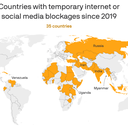Internet blackouts skyrocket amid global political unrest

Where there’s a coup, there will probably be an internet outage.
Why it matters: Internet disruptions in Myanmar early Monday morning coincided with reports that top politicians, including the country’s de-facto leader Aung San Suu Kyi, were being rounded up by the military. That’s no surprise: internet blackouts are now common around the world when power hangs in the balance.
The big picture: At least 35 countries have restricted access to the internet or social media platforms at least once since 2019, according to Netblocks, a group which tracks internet freedom. Authorities have used the outages to reduce or prevent unrest — or to hide it from public view.
- Blockages are particularly common around elections in Africa, most recently in Uganda.
- Netblocks also reported disruptions in Russian cities during recent protests over the detention of Alexey Navalny. Neighboring Belarus also disrupted the internet during recent protests, as have countries from Algeria to Zimbabwe.
Driving the news: Myanmar’s military followed the tried and true rule of coup plotters everywhere by ensuring they were in control of state TV before making their move on Monday. But they also appeared to follow the more modern playbook.
- Internet disruptions began at around 3am local time, according to Netblocks, and connectivity had by 8am dropped by 50% before being “partially restored” by the afternoon.
- Flashback: In 2019, Myanmar imposed what Human Rights Watch has described as “the world’s longest internet shutdown” in the conflict-ridden Rakhine and Chin states.
Between the lines: The internet was created to democratize information, but it's now one of the most powerful weapons autocrats use to silence dissenters and maintain power.
- Iran and Venezuela are particularly quick to restrict access, according to Netblocks’ data.
- Ethiopia has repeatedly done so so during mass protests, and the government blocked internet and telecom access in the Tigray region ahead of a military offensive there last November — severely impacting the availability of reliable information about the conflict.
- India has disrupted the internet both in response to protests and as a pre-emptive tactic. The government shut off the internet in August 2019 as it anticipated unrest in Indian-administered Kashmir once highly sensitive constitutional changes were announced. It has still not been fully restored.
Between the lines: Authorities often cite a desire to stop the spread of disinformation when implementing internet shutdowns, as in Sri Lanka in 2019 following deadly bombings.
- Turkey temporarily blocked access to several social media platforms last February amid reports that dozens of Turkish troops had been killed in an airstrike in Syria.
- Then there are countries like China where the internet is highly censored to begin with.
Yes, but: As with so-called “fake news” laws, such restrictions are often motivated by a desire to control the narrative and prevent inconvenient information from proliferating.
The bottom line: Internet censorship by government or military forces is one of the clearest signals that democracy is being tested.